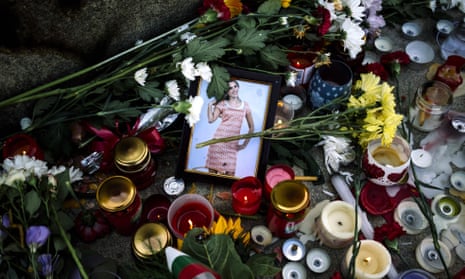Twenty-one years ago, the rising toll of attacks on journalists – and the fact that almost all of the crimes went unpunished – led Unesco to pass a resolution condemning violence against the media. It stressed that assassinations not only cut short individual lives, but attack freedom of expression, exacting a broader toll on society. Today, those concerns are more serious and widespread than ever. Nine in 10 of the more than 1,000 killings condemned by Unesco between 2006 and 2017 remain unsolved. Almost all were local journalists rather than foreign correspondents. Some were killed by criminals, armed groups and terrorists; but others by or on behalf of politicians or parts of the state.
Last week, Bulgarian journalist Viktoria Marinova, who had been reporting on alleged corruption, became the third journalist to be murdered in the EU in under a year. Her death followed those of Slovakia’s Ján Kuciak (and his fiancée) and Malta’s Daphne Caruana Galizia. In the same week, Saudi Arabian journalist Jamal Khashoggi vanished after visiting his country’s consulate in Istanbul; Turkish officials said they believed he was murdered and it is clear that he has at the least been abducted. Many more have lost their lives this year, including the 10 Afghan reporters killed in April.
These are the most extreme and frightening manifestation of broader pressures. Ankara has been the main source of pressure on Riyadh over Mr Khashoggi. Yet Amnesty International says Turkey has become the world’s biggest jailer of journalists since Recep Tayyip Erdoğan became president, with more than 100 in prison. In Myanmar, Wa Lone and Kyaw Soe Oo of Reuters are serving seven years on state secrets charges; they had been investigating the killing of Rohingya villagers by state security forces. The Philippines has revoked the licence of independent website Rappler, though it continues to operate. Founder Maria Ressa called the environment for journalists in the region the worst in three decades.
Donald Trump’s love-in with Saudi Arabia and utter indifference to human rights elsewhere helped to create the conditions in which Mr Khashoggi was so vulnerable. But his vicious rhetorical attacks on “fake news” and the media as “the enemy of the people” have also been a gift to strongmen, and have raised the risk of physical attacks on the press by his supporters at home, as UN experts warned this summer.
Authoritarian leaders and others do not only turn upon critical media from vanity. It is also because they know that to silence journalists is to silence the voices of all those who speak through the media, or who might be tempted to speak in future. Courageous journalists are often among the few forces defending democracy or at least offering some check on power: the people to whom citizens turn when police and courts and political institutions fail them; the people who can inform citizens of what is really happening.
They will remain a target as long as their attackers get away with it. This much was clear in 1997, when Unesco stressed the need to pursue and prosecute killers. Yet too often no action is taken; or those charged are the ones accused of taking orders to kill, rather than those who gave them – as in Ms Galizia’s case at present. Her family are still pursuing a public inquiry. The European commission, Germany and others have rightly urged Bulgaria to investigate Ms Marinova’s murder and bring her killers to justice. But without sustained pressure – including for independent or joint investigations, should domestic ones fall short – those responsible for journalists’ deaths will go unpunished, and more journalists will die.
